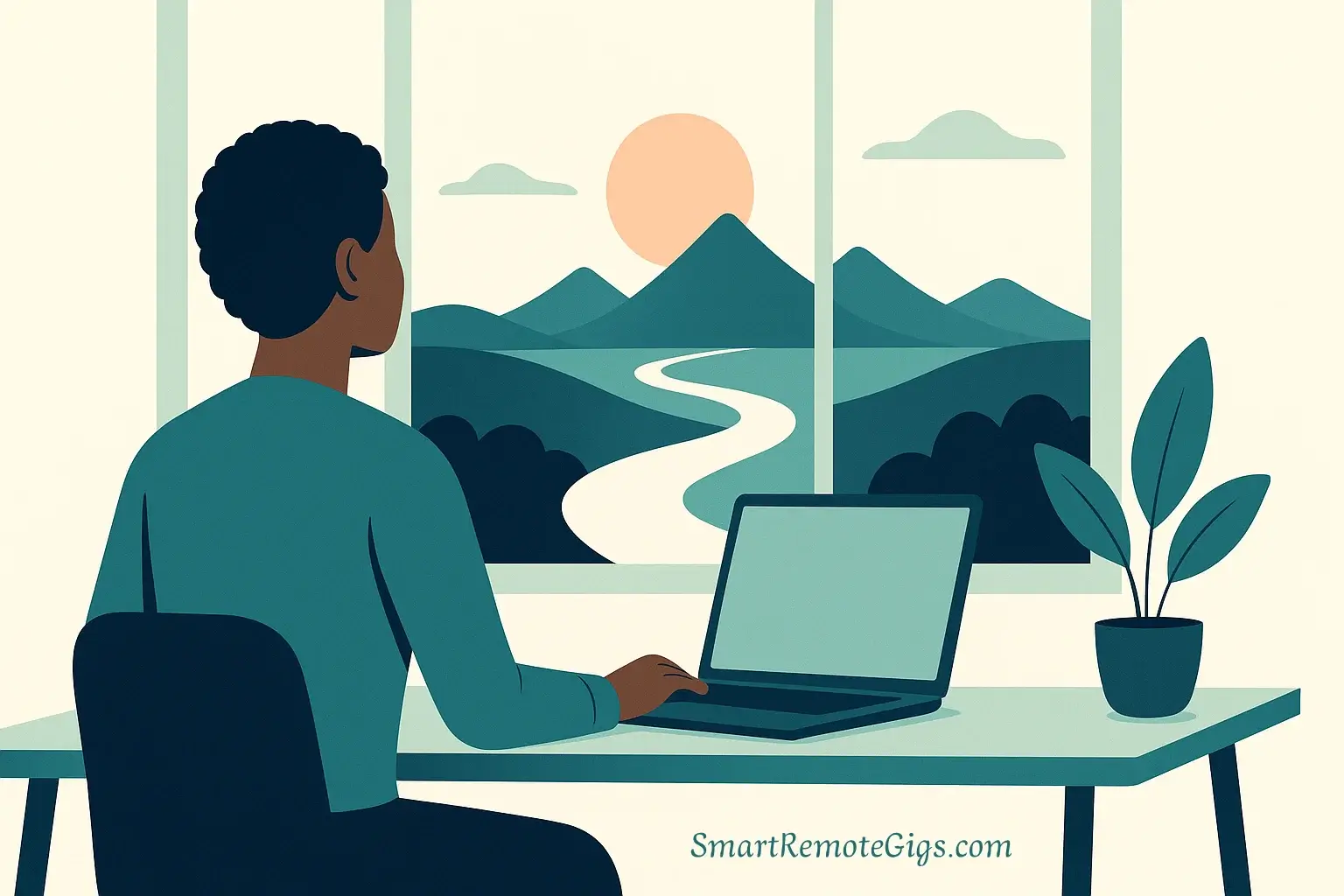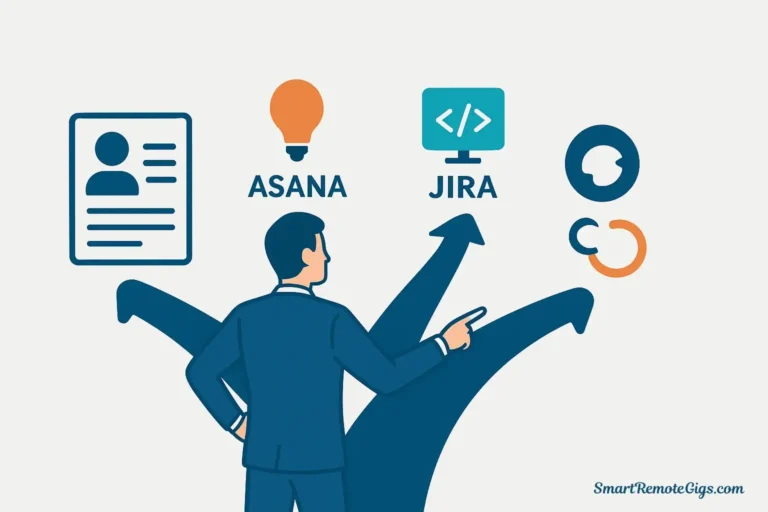It’s the classic career paradox: you need a remote job to get experience, but every remote job posting seems to require experience. If you’re tired of scrolling through endless listings that demand “3+ years of experience” for supposedly “entry-level” positions, you’re not alone. This comprehensive guide is here to break that frustrating cycle once and for all.
Remote jobs no experience opportunities do exist—you just need to know where to look and how to position yourself effectively. Whether you’re a recent graduate, career changer, or someone looking to escape the traditional office environment, this guide will provide you with a step-by-step plan, a curated list of real jobs you can apply for today, and the exact skills you need to land them.
By the end of this guide, you’ll have access to over 75 legitimate entry level remote jobs, proven strategies for skill development, and a 30-day action plan to get you hired. Let’s transform your job search from frustrating to successful.
The “No Experience” Myth: How to Reframe Your Existing Skills
The biggest barrier to landing work from home no experience positions isn’t your lack of qualifications—it’s your perspective. Every interaction you’ve had, every challenge you’ve overcome, and every responsibility you’ve managed has equipped you with transferable skills that remote employers desperately need.
Inventory Your “Life Experience”
Remote work success hinges on soft skills that you’ve likely been developing without realizing it. Here’s how to identify and articulate your hidden qualifications:
From Retail/Customer Service:
- Conflict resolution and de-escalation
- Multi-tasking under pressure
- Clear written and verbal communication
- Problem-solving in real-time
- Working with diverse personalities
From Food Service:
- Time management and prioritization
- Team collaboration
- Attention to detail
- Grace under pressure
- Customer satisfaction focus
From Parenting/Caregiving:
- Project management (managing family schedules)
- Budget management
- Crisis management
- Teaching and mentoring abilities
- Exceptional organizational skills
From Academic Experience:
- Research and analytical skills
- Written communication
- Meeting deadlines
- Learning new concepts quickly
- Presentation abilities
“The skills you need for remote work aren’t just learned in offices—they’re developed through life experience. The key is learning how to communicate their value effectively.”
– Remote Work Industry Report 2025
The Two Paths to Your First Remote Job
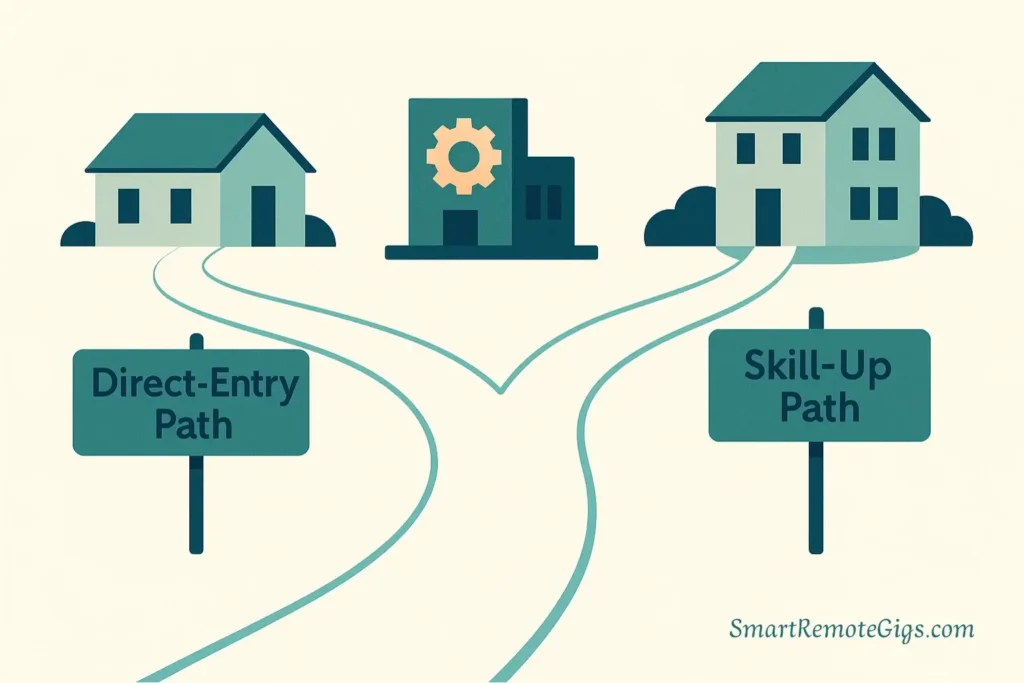
Your journey to online jobs for beginners 2026 follows one of two strategic approaches:
- The Skill-Up Path: Invest 2-4 weeks learning in-demand skills through free online training, then apply for higher-paying career-track remote positions.
- The Direct-Entry Path: Apply immediately to entry-level positions that prioritize attitude and communication over specific experience.
Both paths are valid, and your choice depends on your timeline, financial situation, and career goals. Many successful remote workers combine both approaches, starting with direct-entry positions while building skills for advancement.
A common concern for many job seekers is the lack of a traditional college degree. The good news is that for remote work, this is rarely a barrier. Companies increasingly prioritize provable skills over formal education.
➡️ Learn More: How to Get a Good Remote Job Without a College Degree
Path 1: The Skill-Up Path – Gaining In-Demand Remote Skills
If you’re wondering how to get a remote job with no experience while positioning yourself for long-term career growth, the skill-up path is your answer. By investing a few weeks in targeted learning, you can leapfrog over other candidates and access higher-paying opportunities.
Top 5 In-Demand Remote Skill Categories for 2026
The remote job market has evolved significantly, with certain skills commanding premium salaries and abundant opportunities:
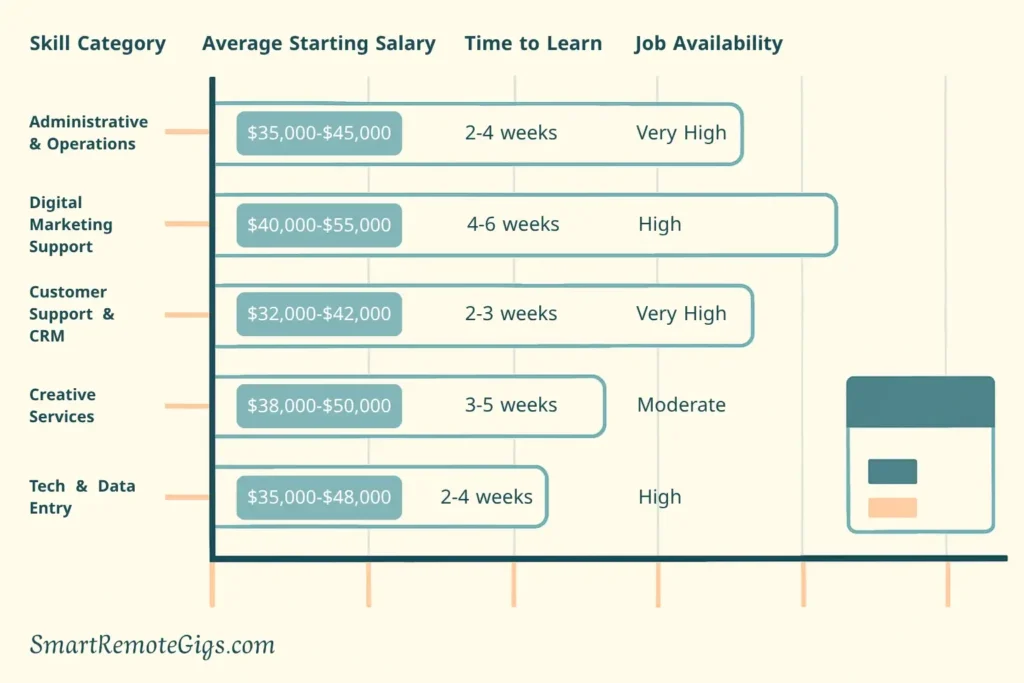
1. Administrative & Operations (Virtual Assistance) Virtual assistants are in unprecedented demand as businesses embrace remote operations. Key skills include:
- Email management and scheduling
- Basic project management (Trello, Asana)
- Document creation and organization
- Customer communication
- Social media scheduling
2. Digital Marketing Support Small businesses need help managing their online presence but can’t afford full marketing agencies:
- Social media content creation
- Basic SEO understanding
- Email marketing assistance
- Content writing and editing
- Analytics reporting
3. Customer Support & CRM Management Remote customer service has exploded, with companies seeking empathetic communicators:
- Help desk software proficiency
- Live chat management
- CRM data entry and maintenance
- Ticket escalation protocols
- Customer satisfaction tracking
4. Creative Services The creator economy has created demand for basic design and content creation:
- Canva design skills
- Basic video editing
- Content writing
- Podcast editing
- Social media graphics
5. Tech & Data Services Technology companies need entry-level support for data management and quality assurance:
- Data entry and verification
- Basic software testing
- Website content updates
- Database maintenance
- Technical documentation
Where to Get Trained: A Curated List of Free & Paid Resources
The beauty of remote careers for beginners is that most required skills can be learned online, often for free. Here’s your training roadmap:
Platform | Best For | Cost | Certification | Time Investment |
|---|---|---|---|---|
Digital Marketing Fundamentals | Free | Yes | 40 hours | |
Marketing, Sales, Customer Service | Free | Yes | 20-60 hours | |
Professional Certificates | $39-79/month | Yes | 3-6 months | |
Specific Skills Training | $10-200 | Completion | 10-50 hours | |
Business & Tech Skills | $29.99/month | Badge | 1-20 hours | |
Creative Skills | $99/year | No | 1-10 hours |
Free Certification Priority List:
- Google Digital Marketing & E-commerce Certificate – Comprehensive marketing foundation
- HubSpot Content Marketing Certification – Essential for content roles
- Microsoft Office Specialist – Critical for administrative positions
- Google Analytics Individual Qualification – Valuable for marketing support
- Salesforce Trailhead Certifications – High-demand CRM skills
➡️ 5 Free Certifications to Help You Land a Remote Job Fast
Building a Portfolio with Zero Clients

The portfolio paradox mirrors the experience paradox: you need work samples to get work, but you need work to create samples. The solution is creating spec work and passion projects that demonstrate your capabilities.
Start by choosing real businesses in your target industry and creating sample work for them—social media posts, email campaigns, or marketing materials. Document your process and present it as professional concept work. You can also launch passion projects like blogs or volunteer your services for nonprofits.
For detailed strategies, platform-specific guidance, and step-by-step portfolio creation techniques, see our comprehensive guide: ➡️ How to Build a Killer Portfolio When You Have No Clients
Path 2: The Direct-Entry Path – 75+ Remote Jobs You Can Apply for Now
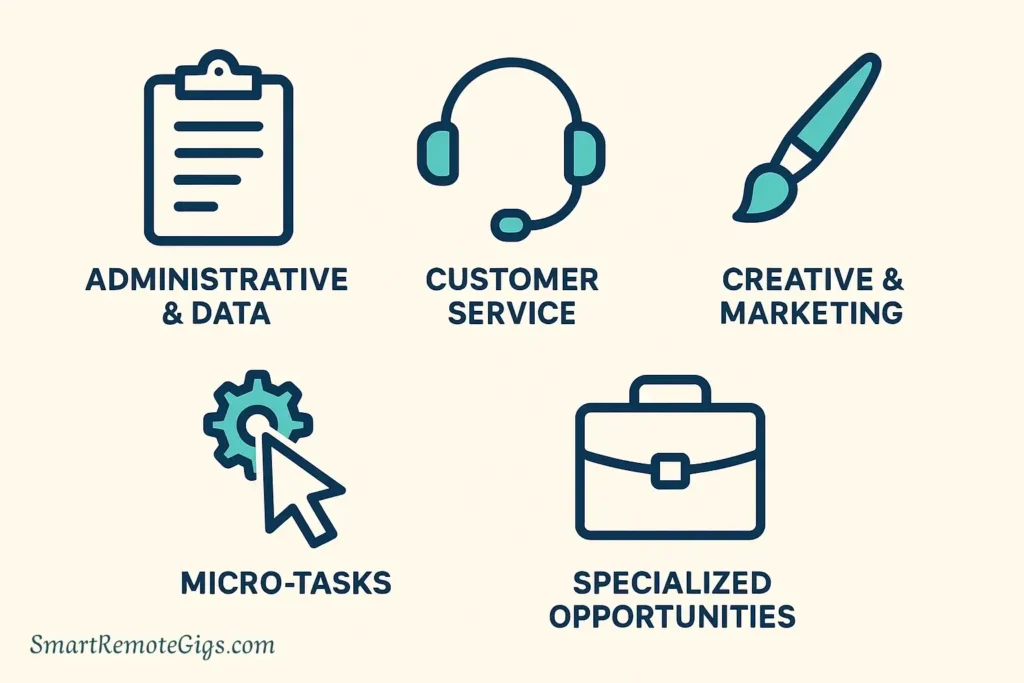
If you need income immediately and prefer learning on the job, the direct-entry path offers numerous entry level remote jobs that prioritize attitude, communication skills, and reliability over specific experience. These positions often provide training and can serve as stepping stones to higher-level roles.
Below is our comprehensive, detailed list of over 75 remote jobs. If you’re looking for a quicker, more scannable overview first, our dedicated listicle is the perfect place to start.
➡️ For a Quick Overview: 25+ Entry-Level Remote Jobs and What They Actually Pay

Administrative & Data Jobs

Customer Service Jobs

Creative & Marketing Jobs
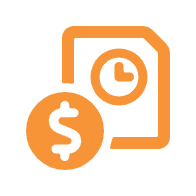
Micro-Task & Gig Economy Jobs
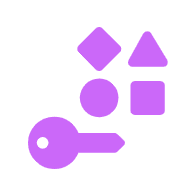
Specialized Entry-Level Opportunities
Your Application Toolkit: Resume, Cover Letter, and Interview Prep
Landing work from home no experience positions requires a strategic approach to applications. Your toolkit needs to compensate for limited work history with compelling presentation of your potential and transferable skills.
The No-Experience Remote Resume
A traditional chronological resume can actually hurt your chances when you lack direct experience—it highlights gaps rather than potential. To succeed, you must adopt a skills-based (or hybrid) resume format that puts your capabilities front and center.
The key is to lead with a powerful Professional Summary, make your “Skills” section the star of the show, and reframe past experience to showcase transferable abilities like communication and problem-solving.
For a complete walkthrough, downloadable templates, and before-and-after examples, read our full guide: ➡️ How to Write a Remote Resume with No Experience (Examples)
Nailing the Zoom Interview & Follow-Up
A remote interview is a direct test of your remote-work readiness. Success depends on your technical setup and your ability to build rapport through a screen. A professional setup doesn’t have to be expensive.
- For your setup: Learn exactly what you need (and what you don’t) with our budget-friendly guide.
➡️ Get the List: Essential Home Office Tech for Your First Remote Job <$200
The interview isn’t over when you close Zoom. A powerful thank you email is your final chance to make an impression and showcase your written communication skills.
- For the interview & follow-up: Get checklists, talking points, and email templates in our complete guides.
➡️ How to Ace a Zoom Interview: Tips for Remote Job Seekers
➡️ The Perfect Thank You Email After a Remote Interview
Red Flag Warning: How to Spot and Avoid Remote Job Scams
The demand for remote work has led to a rise in sophisticated scams. Protecting yourself is non-negotiable. Be on high alert for any job that asks you to pay for training or equipment, offers unrealistic pay for simple tasks, or conducts the entire process over text message.
Legitimate companies will never ask you to send them money or provide sensitive bank details before a formal, verified offer. To learn about the most common scam types (like the fake check scam) and get a full safety checklist, read our dedicated guide: ➡️ Red Flags: How to Spot and Avoid Remote Job Scams
Where to Find the Jobs: Top Platforms & Pro-Level Tactics
Now that your resume is ready, it’s time to find the best places to apply. Not all job boards are created equal, and the most savvy job seekers know how to find opportunities that others miss.
- For a Curated List: Our honest review covers the top platforms for finding high-quality, legitimate remote work.
- ➡️ Read the Review: The 10 Best Remote Job Boards: An Honest Review for 2026
- For an Advanced Edge: Learn how to use simple Google commands to uncover hidden jobs that are never posted on major boards.
- ➡️ Learn the Technique: How to Use Google Search to Find Hidden Remote Jobs
Your 30-Day Action Plan to Getting Hired
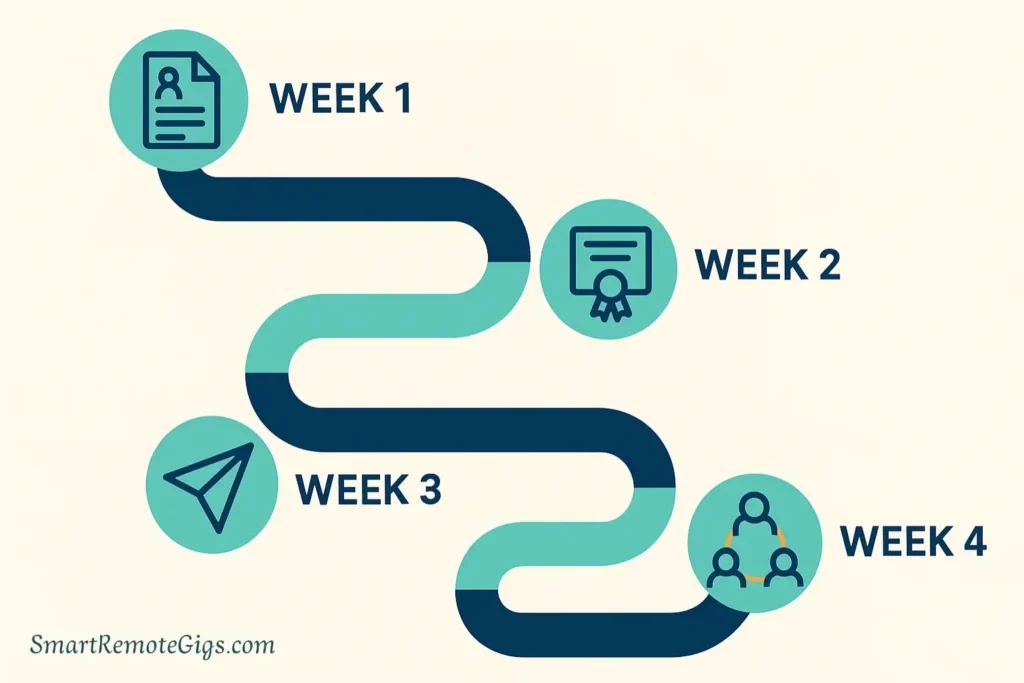
Converting this comprehensive guide into action requires a structured approach. This 30-day plan transforms information into employment, giving you specific weekly targets to land your first remote position.
Week | Focus | Key Actions to Complete |
|---|---|---|
1 | Foundation | Rewrite resume using skills-first format |
2 | Skill Building | Enroll in 1 free certification course |
3 | Application | Blitz Submit 15-20 customized applications |
4 | Networking & Interviews | Conduct 2-3 informational interviews |
Daily Success Habits (15-30 minutes each day)
- Check job boards for new postings matching your criteria
- Engage with industry-related content on LinkedIn
- Practice one new skill for 15 minutes
- Track applications and follow up on employer communications
Success Metrics to Track
- Week 1: Resume completed, LinkedIn optimized, 50 job postings analyzed
- Week 2: 1 certification started, 1 portfolio piece created, 3 communities joined
- Week 3: 15+ applications submitted, 10 LinkedIn connections made
- Week 4: 5 networking conversations, interview skills practiced and refined

Frequently Asked Questions
What is the easiest remote job to get with no experience?
Data entry, transcription, and customer service roles offer the lowest barriers to entry because they prioritize basic skills like attention to detail and communication over specialized experience. Companies like Rev, TranscribeMe, and LiveWorld regularly hire beginners with full training provided, making these your most reliable entry points into remote work.
Can I really get a remote job with absolutely zero work experience?
Yes, but you need to reframe what counts as “experience”—managing schedules shows project management skills, helping others with technology demonstrates support abilities, and academic work proves communication capabilities. The key is presenting these life experiences as professional qualifications on your resume and during interviews.
How much can I realistically earn in my first remote job?
Entry-level remote positions typically pay $13-25/hour for roles like customer service and virtual assistance. With a few weeks of targeted training through free certifications, you can target career-track roles paying $35,000-$55,000 annually. Most start with lower-paying positions then transition to higher-paying roles within 6-12 months.
How long does it take to get hired for a remote job with no experience?
Most focused job seekers land their first remote position within 30-60 days, depending on consistency in applications (3-5 daily), willingness to start entry-level, and ability to demonstrate soft skills during interviews.
What equipment do I need to start a remote job?
Most entry-level remote jobs only require three things: a reliable computer, a high-speed internet connection (at least 25 Mbps), and a quality headset with a microphone. Companies hiring for specialized roles will typically provide any required software, so avoid any “job” asking you to purchase equipment upfront.
Conclusion
The path from “no experience” to thriving remote professional isn’t just possible—it’s happening every day for people just like you. Whether you choose the Skill-Up Path to build marketable capabilities or the Direct-Entry Path to start earning immediately, success comes down to strategic action and persistent effort.
Remember that remote jobs no experience required do exist across every industry and skill level. The key is positioning yourself effectively, demonstrating your remote work capabilities, and staying persistent through the process. The companies hiring for these roles need reliable, communicative, and motivated team members—qualities that have nothing to do with previous remote work experience.
Your remote career starts now. Choose one action from the 30-day plan and take that step today. Whether it’s updating your resume, signing up for a free certification, or applying to your first remote position, forward momentum is what transforms opportunity into employment.
The future of work is remote, and there’s never been a better time to join this movement. Your experience starts with your first remote job—and that job is waiting for you to apply.
Top Remote Job Categories for Beginners with No Experience

Administrative & Data Jobs
Entry-level roles like Virtual Assistant, Data Entry Clerk, and Transcriptionist that prioritize strong communication, time management, and attention to detail.
Excellent starting point for developing foundational remote work skills like organization and data management, with many opportunities for growth.
Editor's Rating:
Visit Website
Customer Service Jobs
Roles like Customer Service Representative and Tier 1 Tech Support that are in high demand and focus on empathy, problem-solving, and clear communication.
A reliable path into the remote workforce, offering valuable experience in communication, conflict resolution, and CRM software.
Editor's Rating:
Visit Website
Creative & Marketing Jobs
Beginner-friendly creative roles such as Social Media Assistant, Content Moderator, and basic Graphic Designer that leverage creativity and digital literacy.
Offers a direct pathway to high-demand marketing careers by building a portfolio of real-world content and design work.
Editor's Rating:
Visit Website
Micro-Task & Gig Economy Jobs
Flexible, low-barrier-to-entry tasks like Website User Testing and Search Engine Evaluation that can be done on your own schedule to build initial experience.
A perfect way to start earning immediately and develop skills like attention to detail while exploring different types of remote work.
Editor's Rating:
Visit Website
Specialized Entry-Level Opportunities
Career-track roles like Virtual Bookkeeping Assistant and QA Tester that provide on-the-job training in specialized, in-demand fields.
An excellent way to bypass traditional experience requirements and gain direct entry into more technical and higher-paying remote career paths.

